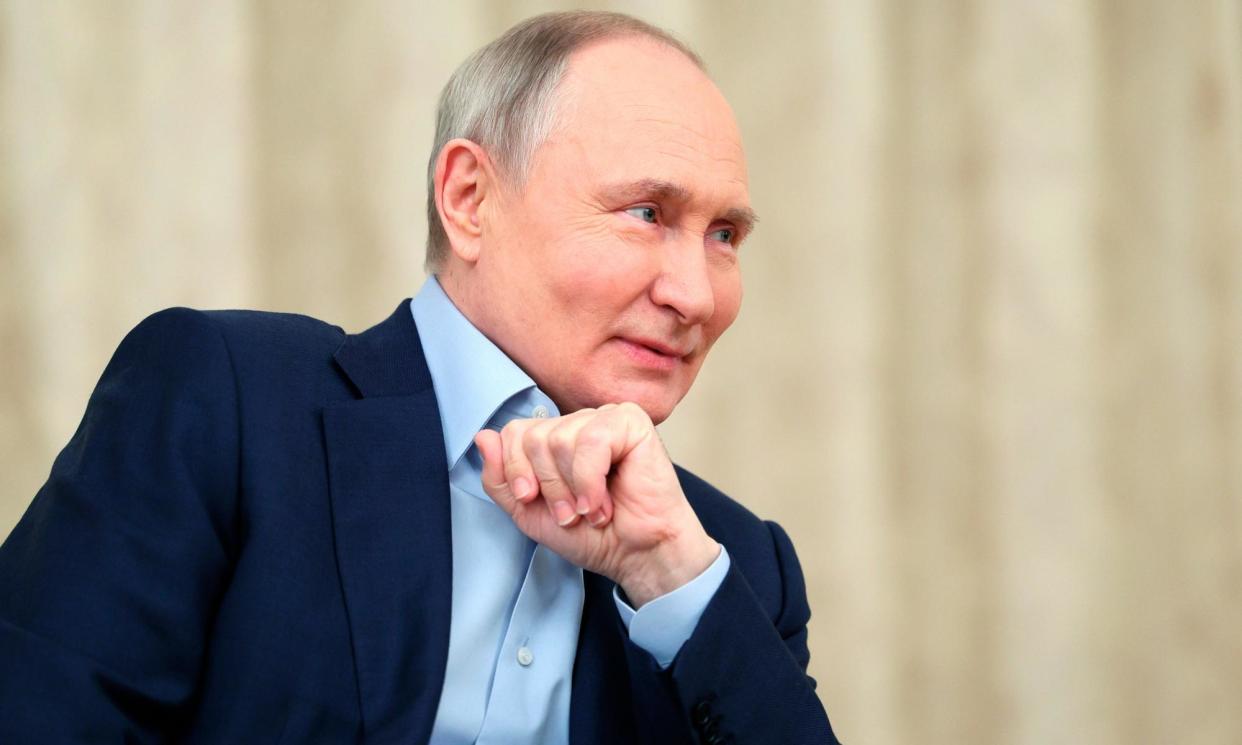Putin won’t lose Russia’s election, but his grip on power could be weakened

In December, Vladimir Putin finally ended any suspense by announcing his candidacy for a fifth term as Russia’s president. With a blend of resignation and cynicism, the world will watch as the country gears up for another presidential “election” – a term I employ with the heaviest of quotation marks.
In the lead-up to the election, Russia will undergo a cosmetic transformation. Streets will be cleaned, buildings given a fresh coat of paint and pensioners handed their electoral encouragement: a free meal. On the day of the election, students and state employees will be herded to polling stations to perform their most important job: voting in an orchestrated display of fealty to Putin.
Putin will feign humility at his landslide victory, in what will probably be touted as a historic turnout. And yet, rigged as it will be, the election is profoundly important, as Putin knows very well – consider why he exiled his biggest political opponent, Alexei Navalny, to a remote Arctic colony.
Authoritarian elections are more than mere theatrics: they are a critical tool for dictators to maintain power. If conducted effectively, sham elections solidify a ruler’s authority. However, if executed poorly, they can jeopardise an entire regime.
Beneath the veneer of absolute power lies a truth known to every tyrant: no ruler governs alone. Every leader only holds power as long as they maintain the support of their winning coalition – key decision-makers who have the power to retain or oust them. In democracies, this coalition consists of the majority of voters, but for Putin, it is his inner circle – those friends and confidants who helped him rise to power and whom he repaid with top positions in government and industry.
Elections are a time of reckoning for all regimes. In autocratic regimes, the reckoning is informal and takes place behind closed doors. In the lead-up to the election, the autocrat and their inner circle review the deal they struck. The leader must demonstrate strength, as evidence of their continued ability to guarantee the safety and prosperity of the inner circle. In return, the inner circle proves its continued loyalty. Political appointees deliver the votes; economic oligarchs pitch in to pay for the campaign; the security apparatus stands by to foil dissent.
The public – the “voters” expected to rubber-stamp the leader’s continued rule – might seem negligible but are in fact a weathervane of the regime’s stability. They reflect whether the regime’s blend of repression and propaganda is effective or in need of recalibration.
This highly orchestrated process leaves little room for surprises, making elections a period of vulnerability for the leader and their supporters. In the aftermath of Russia’s heavily rigged 2011 parliamentary election, protesters took to the streets in Moscow and St Petersburg, leading to the rise of Navalny and his formidable political apparatus. Though those protests were eventually suppressed, this isn’t always the case. In January 2005, five years before he finally became Ukraine’s president, Putin’s ally Viktor Yanukovych was forced to resign from his post as prime minister after public protests erupted when he claimed victory in a rigged presidential vote.
Having learned from these experiences, Putin has constructed an extensive apparatus of repression that obviates any chance of mass protests in Russia. An autocrat-in-chief for a quarter-century, Putin also knows how to leverage elections to threaten, divide and co-opt the opposition by allowing some candidates to appear on the ballot and banning others. Then, while those in the first category decide whether to partake in the charade and share the spoils, the forbidden opponents bicker over whether to boycott the election or converge behind a single “allowed” opposition candidate.
With Russia’s economy seemingly rebounding from the initial shocks of western sanctions, Putin’s case is quite strong. Skewing ideologically conservative and nostalgic for the Soviet Union in its prime, none of Putin’s elites have personally lost any sleep over the war in Ukraine. Nevertheless, Putin is not entirely secure. The mysterious demise of Yevgeny Prigozhin illustrates the lengths to which Putin will go to avoid embarrassment and maintain order before his election.
Unexpected developments that may expose Putin’s weakness to his inner circle right before the re-evaluation of their mutual quid pro quo are a significant concern. Embarrassments such as a significant battlefield loss in Ukraine, a surge in inflation or even a corruption scandal could weaken Putin’s standing with his elites when he needs them most.
Related: From Gaza to Ukraine, brute force threatens to triumph in 2024
This presents a strategic opportunity for those aiming to weaken Putin’s grip on power. Ukraine has an instinct for striking symbolic targets at pivotal moments – from the sinking of the Moskva battleship to bombing the Kerch Bridge that connects Crimea to Russia during peak vacation season. Perhaps it is plotting a pre-election surprise for Putin. If Ukraine’s western partners are ever to get serious about expropriating Russia’s frozen assets, now is the time.
To be clear, there is no scenario in which Putin loses this election. The next few months, however, will determine what he does upon the conclusion of the electoral farce. If all goes well for him he will emerge as strong as ever, ready for a new round of domestic repression, mobilisation and escalation in Ukraine. If things go less smoothly, Putin may find himself too busy rebuilding his inner circle to pursue more nefarious goals.
Olga Chyzh researches political violence and repressive regimes. She is an assistant professor in the Department of Political Science at the University of Toronto


